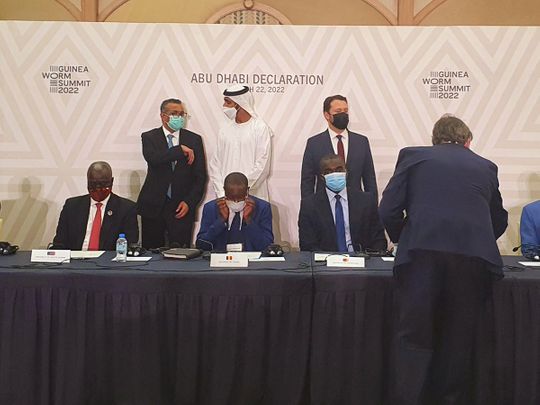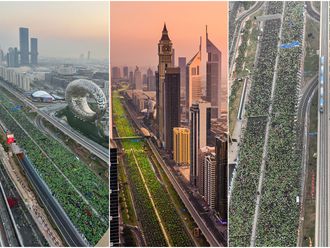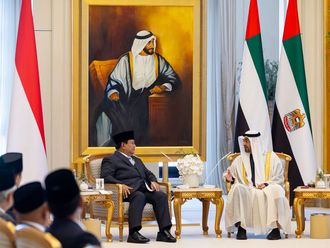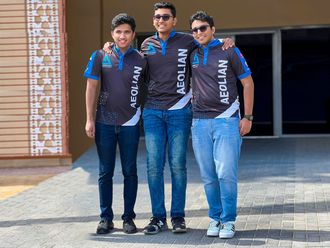
Abu Dhabi: Leaders and experts on Tuesday committed in Abu Dhabi to eradicate Guinea Worm Disease, a neglected tropical condition that causes illness and perpetuates cycles of poverty in affected populations.
The ‘Abu Dhabi Declaration for the Eradication of Guinea Worm Disease’ was signed by ministers from African countries in which the condition is still endemic, in the presence of Sheikh Shakhbout Nahyan Al Nahyan, Minister of State at the Ministry of Foreign Affairs and International Cooperation; Jason Carter, grandson of President Jimmy Carter and member of the board of trustees at the Carter Centre; and Dr Tedros Ghebreyesus, director-general at the World Health Organisation.
The signing ceremony was held at the Qasr Al Watan in Abu Dhabi, with experts stressing that this ‘last mile’ to eradicate the disease globally will be the hardest because it means reaching out to the most remost, hard-to-access communities.
Safe drinking water
“What is crucial now is continued political commitment to support increased access to safe drinking water in areas where people are still at risk of disease, and it must be backed by effective surveillance and responses in all endemic countries,” Dr Ghebreyesus urged.
Only 15 cases of Guinea worm disease were reported globally in 2021 in four countries, namely Chad, Ethiopia, South Sudan and Mali. Two other countries, the Democratic Republic of Congo and Sudan, are waiting to be certified as having eradicated the disease.
The UAE has been collaborating closely with the Carter Centre, a non-profit organisation co-founded by American President Jimmy Carter that has been leading worldwide efforts to Eradicate Guinea worm disease. The partnership began three decades ago after a meeting between President Carter and the UAE’s founding father, the late Sheikh Zayed bin Sultan Al Nahyan. Most recently, in January 2021, His Highness Sheikh Mohamed Bin Zayed Al Nahyan, Crown Prince of Abu Dhabi and Deputy Supreme Commander of the UAE Armed Forces, renewed his financial support to the Carter Centre with a $10 million (Dh36.7 million) gift.
If eradicated, Guinea worm disease will be only the second human disease to be eradicated after smallpox, and it will be the first parasitic disease to be eradicated.
What is Guinea worm disease?
Considered a neglected tropical disease, Guinea worm disease (dracunculiasis) is a parasitic infection caused by the nematode roundworm parasite, Dracunculus medinensis. It is contracted when people consume water from stagnant sources contaminated with Guinea worm larvae. Inside a human's abdomen, Guinea worm larvae mate and female worms mature and grow. After about a year of incubation, the female Guinea worm, which can be as long as one meter, creates a very painful lesion on the skin in order to slowly emerge from the body.
To relieve the burning sensation caused by the emerging worm, patients often try to seek relief by immersing their limbs in water sources. This contact with water however stimulates the emerging worm to release its larvae into the water, and begin the cycle of infection all over again.
Guinea worm is a particularly devastating disease that incapacitates people for extended periods of time, making them unable to care for themselves, work, grow food for their families, or attend school. This therefore promotes poverty for patients and their families.
In 1986, the disease afflicted an estimated 3.5 million people a year in 21 countries in Africa and Asia. This number has decreased by 99 per cent, with only 15 people afflicted last year.
Tremendous progress
Dr Dieudonné Sankara, team leader at the WHO Guinea worm eradication programme, explained that the parasite cannot survive without a host, and that this is the key to eradicating the disease.
“If the worm cannot infect human beings or animals, then it will die out in other sources within a three-month period. This is why eradication means treating water bodies, surveillance of suspected cases, educating communities about drinking safe water, and keeping infected animals away from water bodies,” Dr Sankara said.
The official added that internationally, experts hope to eradicate the disease by 2030.
“This will require political commitment and resources in the hundreds of millions of dollars, but it will cost far less than eradicating polio, another infectious disease the world is working to eradicate. The Abu Dhabi Declaration is one of the first steps to ensure countries renew their commitment. Given how far we have come, I am optimistic that this can be done,” he added.
Ending infected diseases
Guinea worm disease is one of a number of neglected tropical diseases that Abu Dhabi is working hard to eradicate on a global level. Another initiative by Sheikh Mohamed Bin Zayed is committed to eliminating river blindness and lymphatic filariasis, two diseases that lead to thousands of preventable deaths each year.











